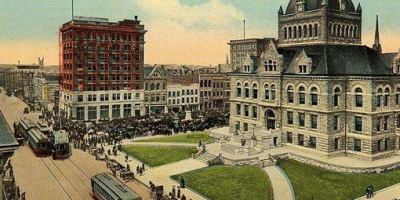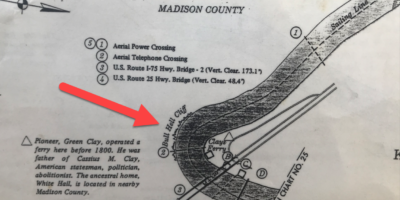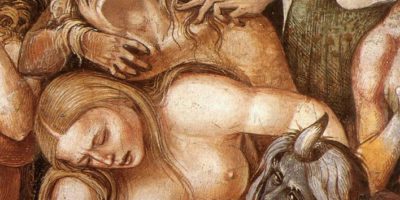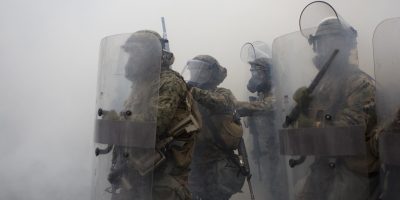By Andrew Battista
The 2011-12 academic cycle is over, and many at the University of Kentucky will remember the year primarily as the “season of the unibrow,” a long odyssey that culminated when the Wildcats won their eighth NCAA men’s basketball championship.
Of course, the bygone academic calendar also doubles as the “year of the protestor,” a period in which activists gathered en masse to beat drums, camp out in tents, and occupy the chasm between the fantasy of justice and the reality of global economic imperialism. Time Magazine did actually name “the protestor” as the Person of the Year in 2011, an honor, Kurt Anderson explains, meant to recognize citizens who “share a belief that their countries’ political systems and economies have grown dysfunctional and corrupt—sham democracies rigged to favor the rich and powerful and prevent significant change.”
As the aura of UK’s national championship begins to fade, I want to make a connection between the sports we follow, the universities that sponsor them, and the education they facilitate. What will be the takeaway memory about UK for students and alums this year: basketball or engaged citizenship? Could it be that college sports actually undermine the mission of our universities to impart a critical thinking that would sustain a just democracy?
Two occupations
The only thing the recent UK basketball season shares in common with the Occupy Movement is that it began with people taking to the streets and ended with riot squad police officers imposing their will on others.
In October, hundreds camped out on the parking lots and patches of grass surrounding Memorial Coliseum because they wanted tickets to a basketball practice. Students sacrificed valuable sleep (not to mention study time) and Kentucky’s working class stalwarts forfeited vacation hours and brought their kids to live primitively along the Avenue of Champions for weeks at a time. One guy, who everyone calls “Wildcat Rick,” has been the first camper to claim a space for each of the past ten years. He acts as a kind of community assembly leader, a coordinator of the communication that happens among the tent city denizens. In his spare time, Rick moderates a web forum called “Wildcat Nation,” which, like Big Blue Madness campout, is a meeting place where fans unite under the auspice of a shared identity, their citizenship in the Big Blue Nation.
Meanwhile, during the same stretch of time last October, hundreds of actual protestors in Lexington gathered at the JP Morgan Chase Bank Plaza on Main Street to join in a growing tide of discontent with income inequality and hawkish greed around the world. Their mere presence in the downtown banking district called attention to the failings of a global economy that is based upon the exploitation of human labor. This was the first time in decades that people got pissed enough to occupy a public space peacefully, yet resolutely, for any length of time. John Calipari did not order pizza for any of the Lexington occupiers, yet they stayed until January 24, when the Lexington police disbanded the settlement.
Fast-forward from those chilly October evenings to the nights in late-March, when thousands of students and fans assembled in the State Street student ghetto and burned furniture, destroyed cars, and assaulted passersby. The nadir of the Final Four victory celebration occurred when a pack of drunken UK loyalists beat up a man who was experiencing homelessness. The man staggered into Christ Church Cathedral the next morning, having been bloodied and bruised. He said fans beat him up just because he had asked for a cigarette. “We can do a better job,” said the pastor of Christ Church. In the wake of the celebration riots, UK President Eli Capiluoto chided students via e mail to “be safe, be respectful, and don’t be stupid.” Nevertheless, we heard about a string of violent incidents after the Wildcats won the championship two days later, including a shooting and other instances of senseless property damage.
The raucous displays of UK students, alums, and admirers had no political meaning and no intended agenda. They weren’t meant to question any economic inequities; they were just puerile acts of exuberant fandom, exercises of a passion that can only be roused by a basketball team.
College sports debase civil society
There’s no doubt that college sports undermine the purpose of a university education. The juxtaposition between these two street occupations—Chase Bank Plaza and Zucotti Park on the one hand and Memorial Coliseum and State Street on the other—has convinced me that the terms of the discussion about college athletics and corruption need to change.
There are literally hundreds of articles and books describing the layers of corruption that drive big-time collegiate athletics programs. One of the latest is Taylor Branch’s “The Shame of College Sports,” which ran in the November 2011 issue of The Atlantic. Branch lists a familiar catalogue of college sports sins: the NCAA extracts billions of dollars from institutions that flourish on the backs of the unpaid “student” athletes. Boosters funnel cars and cash into athletic department backchannels, even as they hypocritically pay lip-service to the myth of amateurism and the classical ideal of Mens sana in corpore sano (a sound mind in a sound body). Meanwhile, coaches grandstand for local car dealerships and rake in salaries that exceed the entire operating budgets of most university departments. What to do about all of this corruption? Pay the athletes? Place limits on television contracts and apparel endorsements?
As incendiary as Branch’s article is, the question is not, “what can we do to clean up college sports,” but rather, “what kind of citizen does college sports produce?” After watching students organize a protest when the Penn State University board of trustees relieved Joe Paterno of his job, I wonder why a fallen football coach can motivate solidarity among students when so many other social problems worthy of our attention exist. As corrupt as college athletics is, I would contend that the greatest shame associated with it is that it corrupts the university mission to educate people who care about the basic human rights of all people.
Of course, the question of what kind of citizens college sports produce is part and parcel of an even larger discussion about the role of education in a democracy. What kind of citizens are colleges preparing? Do people even see college as a preface to life in a civic democracy anymore? College sports engender attitudes toward education and life in society that controvert the ostensible purpose of the college experience: to learn and grow into engaged, informed citizens. Instead, college sports neutralize the potential for students to be active citizens and prepare them to be lifelong boosters of a brand.
According to Noam Chomsky, sports are a cog in the machine that facilitates the acquiescence of the American populace. He suggested in an interview that sports, like religion, is an opiate of the masses. “[I]n our society, we have things that you might use your intelligence on, like politics, but people really can’t get involved in them in a very serious way,” Chomsky said, “so what they do is turn to sports,” which “keeps them from getting involved with things that really matter.”
Chomsky is talking about professional sports in this interview, but the connection to college athletics is even more salient, I believe. College sports are just one among many developments in today’s corporate university structure that has led to the decoupling of education from the life and practice of democracy. Unimaginative curricula, standardized tests, inflated grades, online factory farm assessment, and administrative bloat collectively are symptomatic of a university system that no longer exists to train students to be critical thinkers who can enter life in a public sphere, where each person is bound together by a social contract.
Worse is the notion that the primary goal of college is to prepare workers for a global knowledge economy, as if the only thing that matters about an education is how much money you can make once you complete it. Many parents today have no problem leveraging hundreds of thousands of dollars of debt so their students can attend college, yet they discourage their children from pursuing a course of study that doesn’t have a high payoff in terms of earning potential. Over time in higher education, the tenets of learning, critical thinking, and engaged citizenship have eroded.
I was intrigued by Wendell Berry’s remarks at the recent commencement ceremony at Bellarmine University. Berry, one of the most famous and well-accomplished professors ever to teach at the University of Kentucky, rehashed a familiar story about the decline and fall of higher education. Even though we are obsessed with education as an American society, Berry argues, we are doing nothing more than “promoting a debased commodity, paid for by the people, sanctioned by the government, for the benefit of the corporations.” This is in many instances true, and college athletics is complicit in the academy’s move away from democracy-focused education. Sports take the passion and enthusiasm that comes when students learn new things and neutralizes it.
Sports is not often mentioned in the list of what’s wrong with American higher education. Most people talk about NCAA corruption as if it is separate from the process of education, but the two are inextricable from one another. When students graduate from UK, they are more likely to donate to the K fund than the College of Arts & Sciences general scholarship fund, they are more likely to spend weekends traversing the Southeast following SEC football than doing tornado recovery projects with local chapters of Habitat for Humanity.
What kind of citizens do college athletics produce? We need to think about this question critically as we revision the place of education in our society.







Leave a Reply